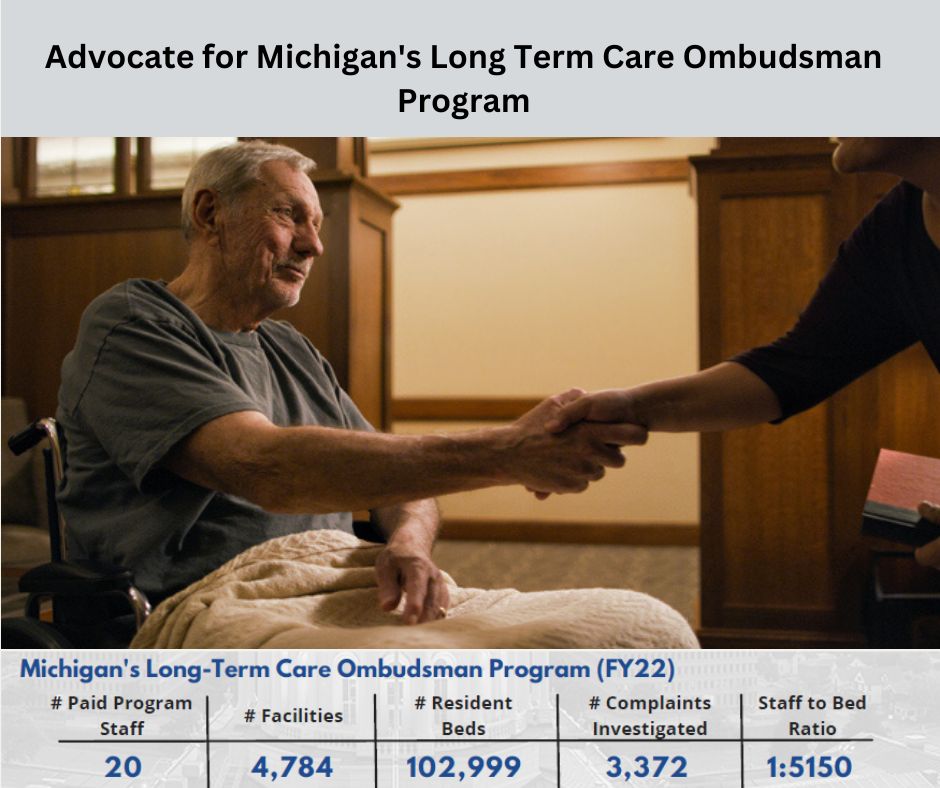
Michigan has 100,000-plus nursing home residents. A crew of 20 “ombudsmen” statewide are charged with advocating on their behalf. That’s 1 person for every 5,000 residents (the Institute of Medicine recommends a ratio of 1 to 2,000).
To say that these champions for some of our most vulnerable citizens are stretched thin is a serious understatement. Last year alone, the three ombudsmen who cover 140 facilities in the area serviced by AgeWays fielded 1,100 complaints from families. Stretched to the limit, they are in reactive mode.
That’s not good.
Our state, in fact, ranks 44th in the U.S. for funding for its Long Term Care Ombudsman program, a critical hedge against abuse and neglect in nursing homes and other licensed assisted living facilities like homes for the aged and adult foster care homes. Funded with state and federal dollars, the LTCO program serves as a bridge between residents and their families and the long-term care facility. Often, the presence of ombudsmen provides a sense of security for residents and their families.
The state inspects about 4,700 long-term care facilities annually, ensuring they are complying with health standards and staffing requirements.
While there is overlap in what the state and the ombudsmen look for, the latter serve as “eyes and ears” in long-term care facilities, alerting inspectors to complaints they’ve fielded. Ombudsmen also focus on quality of life for residents, such as call light response time, personal hygiene, treatment by staff, and other issues that can mean the difference between having some control over your life and being at the mercy of an indifferent or overburdened administration.
Recognizing the importance of the LTCO program statewide, AgeWays is asking the state to add $3 million in the next fiscal year budget to bolster the program (funding is currently at just under $2 million) statewide. The additional funding would add 33 full-time ombudsmen.
“We are so far behind the rest of the country in Long Term Care Ombudsmen staffing,” says Katie Wendel, AgeWays’s director of Planning and Advocacy. “There’s so much more that the program could be if they had capacity for outreach.”
Expanding the LTCO program is part of AgeWays’s 2023 advocacy platform, which will be formally presented to legislators during Senior Action Week in May.
AARP is also pushing for increased funding.
The Covid pandemic shone a light on nursing homes, and the picture wasn’t pretty. Aside from the deaths caused by a virus that ripped through these facilities, we saw the faces of our parents, grandparents and great-grandparents etched with fear and loneliness.
The state budget calls for a much-needed increase in the hourly pay of direct care workers, including those who work in nursing homes. Let’s go further by calling on our legislators to strengthen a program that is free to the public and that does so much to improve the quality of life for residents and to bring peace of mind to families.
If we and the AARP succeed in bolstering the Long Term Care Ombudsmen program, Michigan will rise to 30th in the nation for funding. It’s not a huge jump, but it shows that we live in a state that cares about its older adults and those with disabilities.
“As a state, we aren’t giving long-term care facility residents the resources they should have for advocacy and support,” says Wendel. “Again, we’re responding to complaints and providing excellent service, but there’s so much more that we could do.”
Add your name to letters in support of our platform, which we will highlight during Senior Action Week (May 15-19).
We area also advocating for:
• An increase in hourly pay for direct care workers
• Higher reimbursement rates for the long-term care services and supports provided in the MI Choice Medicaid Waiver Program
• Funding for Caregiver Resource Centers throughout the state
• More funding for non-Medicaid in-home care services and home-delivered meals.
You can sign our electronic form letter that we’ll send to your representatives in Lansing. Please share it with friends and family!